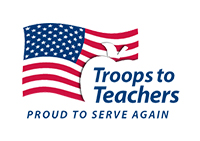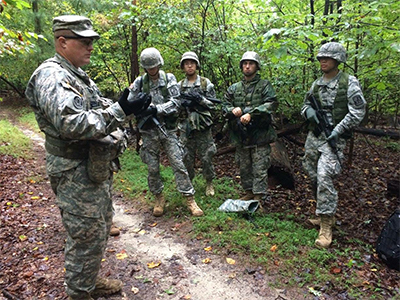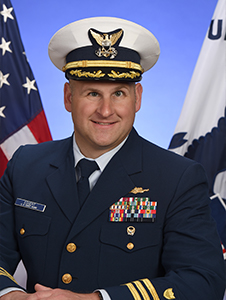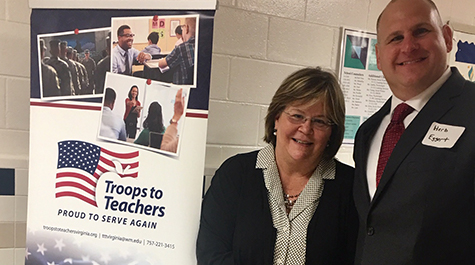A new way to serve
After 22 years in the Army, Jimmy Kimbrough decided he wanted to be a teacher. “I wanted to help young adults better prepare themselves for the challenges they will face upon graduation,” he says. “Over my life, I have benefited from the investment of time and effort by many teachers and mentors. I wanted to pay that forward.”
 Kimbrough, now a social studies teacher at Kecoughtan High School in Hampton, VA, was the very first veteran placed in a teaching position through Troops to Teachers Virginia, now in its third year at the W&M School of Education. Kimbrough serves on the Advisory Committee for Troops to Teachers, and is passionate about the value of veterans in the classroom.
Kimbrough, now a social studies teacher at Kecoughtan High School in Hampton, VA, was the very first veteran placed in a teaching position through Troops to Teachers Virginia, now in its third year at the W&M School of Education. Kimbrough serves on the Advisory Committee for Troops to Teachers, and is passionate about the value of veterans in the classroom.
“First and foremost, the military teaches leadership,” he says. “The leading of military members is no different than leading students. Veterans have the skills to teach, coach and mentor students through the challenges they face in the classroom and in their personal lives. We cannot predict their future, but we can help them develop the skills to cope with and tackle those challenges.”
Thanks to a $1.9 million grant in 2018 from the Virginia Department of Education and the U.S. Department of Defense, Troops to Teachers is recruiting military veterans for second careers as teachers, and offering the wraparound support that veterans need to navigate the complicated pathways of teacher certification, find open teaching positions that fit their skills and interests, and successfully transition to the classroom.
 “The staff understands that each veteran is as unique as their military experiences,” says Kimbrough. “They tailor their services to those needs and do not try to force the veteran into any ‘cookie cutter’ model.”
“The staff understands that each veteran is as unique as their military experiences,” says Kimbrough. “They tailor their services to those needs and do not try to force the veteran into any ‘cookie cutter’ model.”
Last year, Troops to Teachers staff communicated with 1,588 service members and provided 516 individualized counseling sessions. A tracking system allows them to monitor each participant’s progress and identify what support is needed, from discussing potential licensure paths to connecting them with school divisions’ open positions.
Although some participants choose traditional teacher preparation programs, most decide that alternative routes, such as Virginia’s Career Switcher program or provisional licensure, are a better fit given the considerable instructional experience and education they’ve already had during their military service.
Since launching Troops to Teachers, Principal Investigator and Executive Director Gail Hardinge M.Ed. ‘85, Ed.D. ‘96 has focused on outreach to school divisions and other educational partners, sharing the unique benefits of hiring veterans and establishing relationships that help participants connect with open positions. While many school divisions are wary of hiring teachers with provisional licenses, Hardinge stresses that veteran candidates bring something extra.
“Veterans are not your typical provisional teachers,” she says. “Not only do they have crazy leadership skills, but they have a deep sense of service and often bring years of instructional experience to the K-12 classroom.”
To help participants bridge the gap between military culture and the educational context, Troops to Teachers has ramped up career placement services for participants, including mock interviewing and resume review.
“I felt very fortunate to have Troops to Teachers services available to help me with a challenging job hunt, resume assistance and interview preparation,” says Herb Eggert, another alumnus of the program. “Each of those services was a huge help in getting my foot in the door to secure an interview and helping me to make the most of each opportunity and ultimately land a teaching position.”
 After 23 years in the Coast Guard including serving as Commanding Officer of three ships, Eggert transitioned to teaching 10th grade U.S. and Virginia government in Fairfax County. “As a new teacher, the balance between classroom management, instructional design and intense administration can seem overwhelming at times. My experiences in the military have helped me to manage my time effectively and pushed me to make sure I am prepared for each class.”
After 23 years in the Coast Guard including serving as Commanding Officer of three ships, Eggert transitioned to teaching 10th grade U.S. and Virginia government in Fairfax County. “As a new teacher, the balance between classroom management, instructional design and intense administration can seem overwhelming at times. My experiences in the military have helped me to manage my time effectively and pushed me to make sure I am prepared for each class.”
In addition to resume and interview assistance, Hardinge and her team are developing ways for participants to gain in-classroom experience, which can make them more attractive to school divisions that don’t normally hire provisional teachers.
They work with veterans to find opportunities to apprentice in classrooms through options like paid tutoring, working as a substitute teacher with mentoring support, and working in summer school placements. These experiences help veterans better understand the educational context and decide if teaching is the right fit for them.
“It is humbling to work with veterans who are so accomplished, so hard-working, and so dedicated to the next stage of their career,” says Karen Hogue, project specialist for Troops to Teachers. “They’re very appreciative of our efforts, and it’s gratifying to see how much success they have when they take full advantage of our services.”
Troops to Teachers is also dedicated to supporting participants once they’ve transitioned to their K-12 classrooms. With research showing that mentorship during the first three years of teaching is critical in keeping new teachers in the profession, Hardinge is developing ways for Troops to Teachers to provide mentoring support where needed to their alumni.
“One challenge is that there are such disparities in the mentoring experiences provided by different school divisions,” she explains. “Urban and suburban schools typically have the resources to offer multi-level, comprehensive mentoring support for new teachers, while rural and under-resourced schools offer far less.”
To specifically support teachers in rural school districts, Troops to Teachers is partnering with the W&M School-University Resource Network (SURN) to research best strategies for mentoring new teachers in that context and to pilot a program based on their findings.
“We think-tank a lot,” says Hardinge. “The program is constantly evolving based on participant needs and division needs. Ultimately, we want to do everything we can to develop expertise and resouces that will help both military families and K-12 schools in Virginia.”
Hardinge’s expertise has benefited the larger William & Mary campus as well. She and Charlie Foster M.Ed. ‘17, former veteran liaison for Troops to Teachers, co-chaired the Military Veterans Affairs Working Group, which was charged with expanding the university’s support for veteran students. They successfully established the new Office of Student Veteran Engagement this fall, which Foster now leads.
“Our goal is to serve veteran students who have finished their military careers and want the best education available in the world, if you ask me, here at William & Mary,” says Foster. “We know that they have different experiences from their peers, and we just want to help fill in the gap.”
Providing such specialized support makes all the difference for Troops to Teachers participants. With support, coaching and mentorship, veterans are able to bridge the divide from military life to the classroom, bringing their considerable skills and dedication into classrooms and into the lives of young people.
“The teachers that I have encountered remind me very much of my shipmates in the Coast Guard in that they are hard-working, professional and dedicated to the success of the whole team,” says Eggert. “This has been a great transition for me, and I look forward to what I hope is a long second career in education.”
